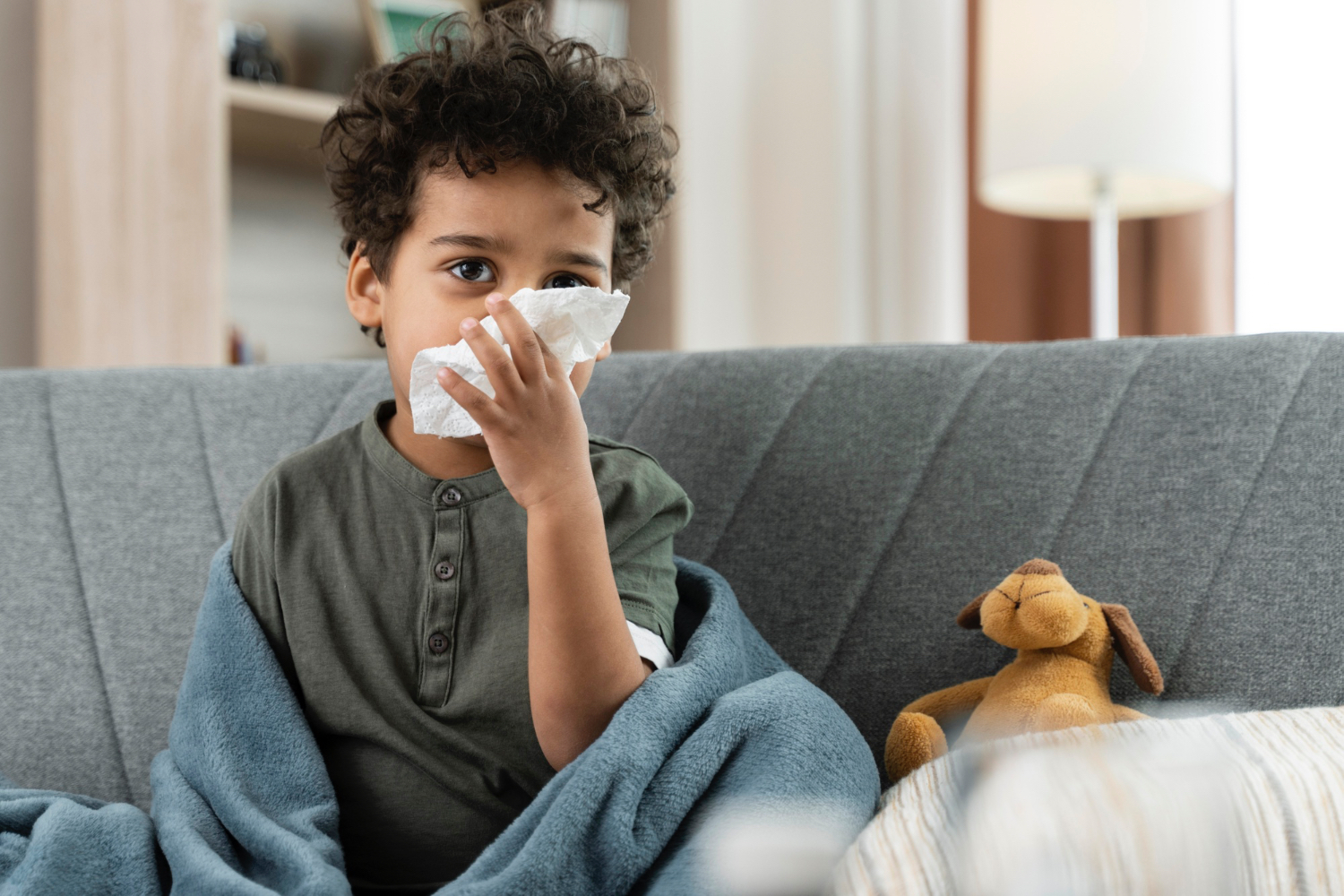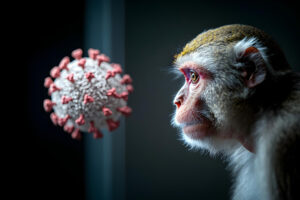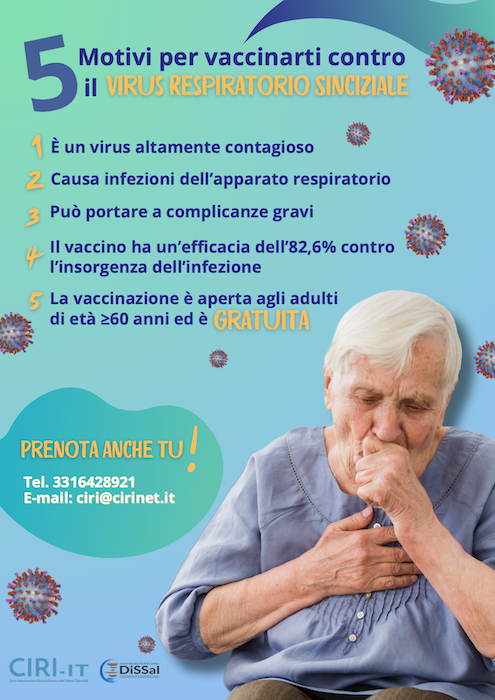Respiratory Syncytial Virus (RSV), belonging to the Pneumovirus genus, is a highly contagious and widespread viral pathogen. RSV primarily affects the respiratory tract, causing rhinitis, bronchiolitis, or pneumonia, particularly in infants and the elderly. Specifically:
- In infants under one year of age: RSV is the leading cause of bronchiolitis and hospitalization.
- In children, adolescents, and young adults: RSV may cause acute respiratory infections (ARI), asthmatic bronchitis, and asthma.
- In adults and the elderly: RSV can exacerbate chronic obstructive pulmonary disease (COPD).
- In the elderly, especially those with co-morbidities: RSV may lead to interstitial pneumonia and acute respiratory distress syndrome (ARDS).
How does it spread?
RSV spreads primarily through aerosolized respiratory droplets from sneezing and coughing or by contact with contaminated surfaces. The virus exhibits seasonal patterns, with outbreaks occurring from autumn to spring in temperate climates.
Symptoms
RSV can infect individuals of all ages, and reinfections are possible. While many infections are mild or asymptomatic, RSV may also cause cold-like symptoms (runny nose, cough, fever), or more severe conditions such as bronchiolitis and pneumonia.
Impact on Children
RSV infections in infants and young children can lead to serious complications and are a common cause of hospitalization. Furthermore, 30–40% of children who develop bronchiolitis may experience recurrent wheezing up to school age, potentially progressing to asthma.
RSV Numbers
The World Health Organization estimates that globally there are:
– million cases of acute lower respiratory infections annually
– Over 3 million hospitalizations in children under 5 years
– 1.4 million RSV-associated hospitalizations in infants under 6 months
– 59,600 deaths in children under 5 years
– 27,300 deaths in infants under 6 months
Who Is at Higher Risk?
Infants, particularly during the first 3 months of life, are at increased risk of severe RSV due to their immature immune system. The most vulnerable include: preterm infants (<37 weeks gestational age), children with chronic lung disease, infants with hemodynamically significant congenital heart disease, children with Down syndrome.
RSV in Adults
Although RSV is often associated with pediatrics, it can also cause serious illness in adults, especially: the elderly, immunocompromised individuals, people with chronic respiratory or cardiovascular diseases (e.g. COPD, heart failure).
It is estimated that 3–6% of adults aged 65+ experience an RSV infection annually, and RSV causes approximately 6,000–10,000 deaths per year in the United States among this population.
Prevention Strategies
Most children become infected with RSV within their first two years of life due to its ease of transmission and surface stability. RSV can survive for several hours on hard surfaces.
To reduce the likelihood of becoming infected, it is possible to adopt some personal protection measures, recommended by the ECDC, valid for most respiratory viruses, including:
Avoid close contact with symptomatic individuals.
Wash hands frequently and thoroughly.
Avoid touching the face (eyes, nose, mouth).
Follow good respiratory hygiene (e.g., cough etiquette).
Keep infants away from people with cold-like symptoms.
Handle babies only with clean hands.
Avoid smoking near infants.
Prefer breastfeeding, when possible.
What is the scientific community doing to combat the spread of RSV?
Given its global health impact, multiple strategies have been developed to combat RSV.
In addition to non-pharmacological measures for individual protection, monoclonal antibodies and vaccines are also available today.
Currently, two monoclonal antibodies are available as specific prophylactic measures:
1.Palivizumab: A humanized monoclonal antibody indicated for high-risk infants, such as preterm newborns. Administered monthly via intramuscular injection during RSV season, it reduces hospitalization risk by ~50%.
2.Nirsevimab (approved by AIFA in 2023): A long-acting monoclonal antibody administered as a single intramuscular dose to all infants in their first RSV season. Clinical trials show: 80% reduction in RSV infections requiring medical attention,77% reduction in RSV-related hospitalizations.
Two vaccines are also available.
1. Recombinant Adjuvanted RSV Vaccine (approved Oct 2023)
Indicated for adults ≥60 years to prevent RSV-related lower respiratory tract disease (LRTD).
Contains RSVPreF3 antigen.
Administered as a single intramuscular dose.
Safety confirmed in Phase III trials conducted in Europe, North America, Asia, and the Southern Hemisphere.
Common mild side effects: injection site pain, fatigue, myalgia, headache, joint pain
2. Bivalent RSVPreF Vaccine (approved 2023)
Approved for adults aged 60 and older and pregnant women between 32–36 weeks gestation ensuring passive immunity to newborns up to 6 months of age.
Composed of two preF proteins (RSVpreF)
Administered as a single intramuscular injection.
Common side effects: injection site pain, headache, muscle pain, nausea
The European Commission approved both vaccines following EMA recommendations, and they are expected to become available in Italy in the near future.
References
- SIMRI- società italiana per le malattie respiratorie infantili. Disponibile al sito: https://simri.it/simri/idPage/102/idNews/1369/Cinque-cose-da-sapere-sul-Virus-Respiratorio-Sinciziale.html.
- Società Italiana di Pediatria. Disponibile al sito: https://sip.it/2021/11/19/virus-respiratorio-sinciziale-e-bronchiolite-tutto-cio-che-i-genitori-devono-sapere/.
- Resvinet – Respiratory Syncitial Virus Foundation. Disponible al sito: https://resvinet.org/it/su-rsv-2/#:~:text=Ogni%20anno%20circa%20il%203,’8%25%20potrebbe%20addirittura%20morire.
- Vaccino RSV: traguardo sempre più vicino, 2023, Fondazione Veronesi. Disponibile al sito: https://www.fondazioneveronesi.it/magazine/articoli/da-non-perdere/vaccino-rsv-traguardo-sempre-piu-vicino.
- Virus sinciziale, l’Ue autorizza il vaccino per gli over 60 – La Repubblica. Disponibile al sito: https://www.repubblica.it/salute/2023/06/06/news/virus_respiratorio_sinciziale_rsv_vaccini-403418728/.
- Protect against RSV with Pfizer’s vaccine ABRYSVO. Disponibile al sito: https://www.abrysvo.com.
- Respiratory Syncytial Virus Infection, 2022, H. Jain, J. W. Schweitzer, N. A. Justice, National Library of Medicine. Disponibile al sito: https://www.ncbi.nlm.nih.gov/books/NBK459215/.
- Virus respiratorio sinciziale, l’Fda approva il primo vaccino per le donne in gravidanza per prevenire l’RSV nei neonati – ParmaStar. Disponibile al sito: https://www.pharmastar.it/news//fda/virus-respiratorio-sinciziale-lfda-approva-il-primo-vaccino-per-le-donne-in-gravidanza-per-prevenire-lrsv-nei-neonati-42040.
- Virus sinciziale, Genova uno dei 4 centri italiani dove vaccinarsi – Primocanale
- https://www.youtube.com/watch?v=UL7KV6kKwtE.
- Quotidiano Sanità
- https://www.quotidianosanita.it/allegati/allegato1711563351.pdf






